Reflections from 2023 Summer Interns
In the summer of 2023, VCE hosted four interns who assisted with numerous projects. Below, you will find reflections from our two interdisciplinary interns, Emily Marple and Juno Stahl.
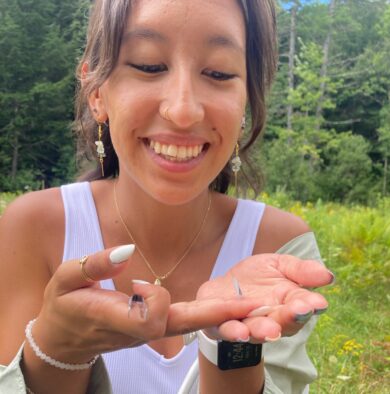
Emily Marple’s Reflection
Hi! My name is Emily, and I am one of VCE’s four interns this summer. Juno and I are the two Interdisciplinary Interns, which basically means that we’ve spent this summer working with a bunch of different people here at VCE. We’ve helped collect data on the composition of dry oak forests for a study on fire ecology with Dr. Ryan Rebozo, surveyed residential homes for Dr. Jason Hill’s research on tick pesticide use and tick and invertebrate populations, built rafts and signs and banded loons with Dr. Eric Hanson, participated in the weekly bird banding with Chris Rimmer and Dr. Desiree Narango on Mount Mansfield, and worked closely with Alexandra Johnson and Emily Anderson on science communications and social media outreach. Clearly, we’ve been busy this summer.
I came into this internship knowing I would be assisting in some way on most of these projects but with little understanding of what that work would really look like. All I knew was that I would spend a lot of time in the field, live with 3 other interns, and work within a much larger organization than any I have worked with in the field of ecology. I thought that this summer would be transformative, and would help guide my career, whether I loved my time here or hated it. As I reflect on these past few months, I am filled with a sense of accomplishment and gratitude for the opportunities that I’ve been fortunate enough to be a part of. My goals coming into this internship were clear: to be challenged, explore a new environment, and work alongside a community of passionate scientists and peers. Looking back, I can confidently say that these goals were met, above and beyond anything I was expecting.
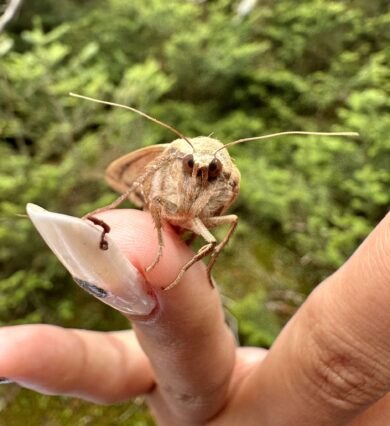 Throughout my internship at VCE, I faced a plethora of challenges that tested my limits and expanded my horizons. One of the most significant challenges was immersing myself in Vermont’s various ecosystems and quickly learning what made them. Although I had imagined that my local ecosystem in my hometown of Mount Kisco, NY, had plenty of similarities to Vermont, it might as well be a different world upon further inspection. From mushrooms to insects, to birds, to plants, I was quickly thrown into the midst of all the biodiversity Vermont has to offer. Inherently, I was accomplishing two of my goals at once: Being in a new environment is challenging, especially for an ecologist. And Vermont has plenty of different ecosystems: from dry oak forests and lakes to Mount Mansfield’s alpine system, the biodiversity within the state is incredible.
Throughout my internship at VCE, I faced a plethora of challenges that tested my limits and expanded my horizons. One of the most significant challenges was immersing myself in Vermont’s various ecosystems and quickly learning what made them. Although I had imagined that my local ecosystem in my hometown of Mount Kisco, NY, had plenty of similarities to Vermont, it might as well be a different world upon further inspection. From mushrooms to insects, to birds, to plants, I was quickly thrown into the midst of all the biodiversity Vermont has to offer. Inherently, I was accomplishing two of my goals at once: Being in a new environment is challenging, especially for an ecologist. And Vermont has plenty of different ecosystems: from dry oak forests and lakes to Mount Mansfield’s alpine system, the biodiversity within the state is incredible.
The physical challenges encountered during this internship were equally formidable and worthwhile. From bushwacking through a forest for miles (on our second day of the job!!) to hiking Mount Mansfield’s rugged and rocky trails during bird banding sessions to lifting cinder blocks from the bottom of remote lakes to move loon nesting rafts, these tasks pushed me to embrace the intrinsic physical nature of this job. Lifting canoes and paddling heavy gear demanded teamwork, coordination (a lot of it), and a good spirit. Overcoming these challenges not only strengthened my body but gave me a new respect for the work we do.
Despite all this, perhaps the most profound challenge was the shift in my own perspective about what it means to be a scientist and researcher. I came into this internship feeling like I had to know everything, and if I didn’t know it yet, I would have to learn it ASAP. On the second day of the internship, we went on a staff hike at Mount Cardigan. I remember feeling overwhelmed and intimidated as I realized just how much I didn’t know as scientists and interns chatted about the plants and birds we passed by. However, as the summer has gone on, my fears have slipped away. Through many conversations with various people during fieldwork, I realize now that the scientists at VCE don’t have an exhaustive knowledge of every facet of ecology (even though some of them come very, very close LOL). Instead, they approach their work with an insatiable desire to learn, continually asking questions and seeking answers, and engaging in collaborative discussions with colleagues. I’ve learned that being a scientist isn’t about having all the answers, but it’s about asking the right questions and being open to exploration and discovery. Lunch conversations revolve around cool bugs posted on iNaturalist and speculations about birds’ migratory patterns, and bad questions don’t exist. Furthermore, there is no “correct” way or timeline to become a scientist. Every single person I’ve talked to has had a completely different journey, yet everyone is still here, working at this amazing job. It’s reassuring to know that as long as I have the same passion for the work I’m doing, I will get to a meaningful place in my career.
As I return to school this fall, I’m excited to use the skills I learned here back in Colorado. Now that iNaturalist and eButterfly feel like old friends (thank you Nathaniel for the crash course), I’m excited to participate in community science over there. I plan on practicing my bumblebee and butterfly handling and to go birding in a new place, now that I have the skills to do so. In addition, I plan on purchasing my own pair of binoculars, a butterfly net, forceps, and jars…all the fun tools I’ve learned how to use this summer—and paying for them with a grant I’m now applying for, after the grant writing workshop we did with Ryan. Apparently, there are a lot of people out there who want to give money to students interested in ecology—thank goodness, because all of this equipment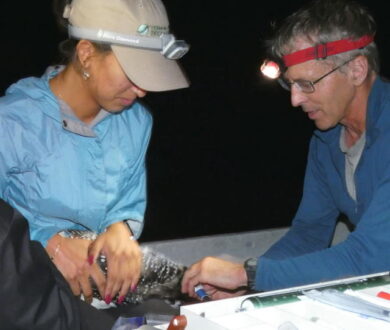 is expensive! Looking further into the future, after talking to so many people about their journeys, I think I’ll strongly consider pursuing a master’s and PhD. In what? Uh… Ask me in a few more years. Regardless of where I end up, I know that the skills I’ve learned here will serve me well in any fieldwork or research position.
is expensive! Looking further into the future, after talking to so many people about their journeys, I think I’ll strongly consider pursuing a master’s and PhD. In what? Uh… Ask me in a few more years. Regardless of where I end up, I know that the skills I’ve learned here will serve me well in any fieldwork or research position.
I know I’ll remember this summer forever. I could tell you about all of the amazing sunsets I saw, the beauty of the male adult loon I had the privilege of assisting in banding, and the butterflies I now know how to identify. I could tell you about the time that not one, not two, but three (!!) of the interns’ cars were in the shop at once, or how we saw two baby black bears climbing a tree behind the intern house. I could tell you about the feeling of the sun on my face, about us laughing and dancing in the kitchen, or the magic experience of feeling a bird flutter against your chest. And these are memories that I’ll cherish forever. Instead, I’ll tell you this: VCE and the people I’ve met this summer changed my perspective on what it means to be an ecologist, and words can’t describe how grateful I am.
Juno Stahl’s Reflection
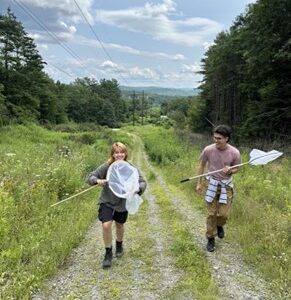
Catching butterflies with Pablo Sosa-Negron, taken by Emily Marple
I’d like to acknowledge the origin of my internship. While I’ve only heard of Alexander Dickey through stories and articles, I feel a real connection to his struggle – but also his love for nature. I can tell he lives on through this internship, and I feel that it is through him that I’ve been able to find a great amount of success this summer.
I struggled, and still do struggle, with my mental health. The thing that has helped me most during my bouts of being stuck in the metaphorical mud has been going outside and getting stuck in literal mud. Just being in the woods, getting leaves in my hair and dirt in my shoes, grounds me to the wonderful and fantastical world I inhabit – and brings me out of my own head. I’ve always had this sort of connection with nature, but it was never something I wanted to pursue as a career. However, the more time I spent learning and benefiting from nature, the more I realized how important it was to protect it (and that studying it had made me more happy than any other subject so far).
Most of my schooling has been in the realm of computer science, so it was terrifying to attempt to make a change to a subject that seemed so different. I was met with many many roadblocks. Both from the school I was attempting to transfer from, and mental blocks of my own design. I was essentially starting over. I would have to build my reputation and knowledge base from the ground up. What I didn’t realize about this, however, is how rewarding it’s been to really learn to advocate for myself.
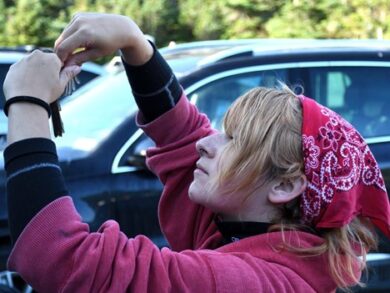
Bird banding on Mount Mansfield. I’m checking for any parasites on the dark-eyed junco (Junco hymalis) I’m holding. Picture taken by Michael Sargeant.
To give myself a little push into the world of conservation science (and get myself out of a slump) I started participating in walks with the Hartford Salamander Team. A group that does monthly (free) ecology-themed walks led by different experts in various fields. One month may be about fungi, another about lady beetles, and another, obviously, about salamanders. This is where I heard about the Vermont Center for Ecostudies – whose staff frequently volunteered to lead the walks. I was inspired by the knowledge that these experts had to offer. Through the Hartford Salamander Team, I had found a listing for the Alexander Dickey internship. Initially, I thought that I had no chance of getting in until I read that they were looking for people who were just starting on their path to becoming an ecologist. I read about Alexander Dickey himself and was surprised by how much I related to his attitude towards nature. How he found solace in the beauty of it all. I knew then that I had to at least try to apply. I was ecstatic when I learned I got into the internship program. I felt like I was finally making a solid step towards working with my true passions. I traded my keyboard for binoculars, my coding manuals for field guides, and my virtual networks for real-life ecosystems.
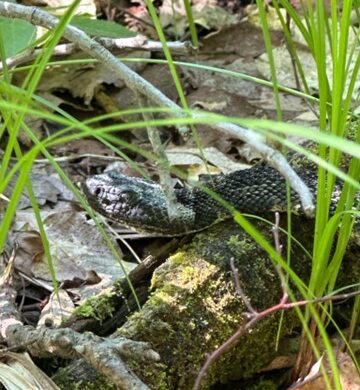
Timber rattlesnake (Crotalus horridus) found while doing fire ecology surveys. The snake seemed completely unbothered by our presence. Photo by Ryan Rebozo.
Although I had spent seven years in the Upper Valley, I realized that I had only scratched the surface of Vermont’s ecological diversity. It was nice to be a tourist in my own state. I visited places I had never even heard of and explored secret oases of wildlife I never would have found on my own. Some of my favorite wildlife encounters this summer included a timber rattlesnake (Crotalus horridus) in southern Vermont and purple pitcherplants (Sarracenia purpurea) in the Northeast Kingdom.
From tree identification to bird banding, from tick surveys to pollinator transects, every experience felt like a step deeper into an enchanting world I had only glimpsed from the periphery. I loved being able to experience working with so many different researchers at the same organization. It’s incredibly unique to find a bunch of researchers who all work under the same roof on different projects. I had the privilege of engaging in a variety of activities that enriched my knowledge and ignited a passion for wildlife and environmental preservation.
My time at the Vermont Center for Ecostudies not only enriched my scientific knowledge and technical skills but also fostered a profound sense of stewardship for the environment. The opportunity to collaborate with dedicated experts, engage in meaningful research, and contribute to conservation efforts has left an indelible mark on my personal and professional journey. As I move forward, I carry with me a deep appreciation for the intricate beauty of nature and an unwavering commitment to preserving it for generations to come.
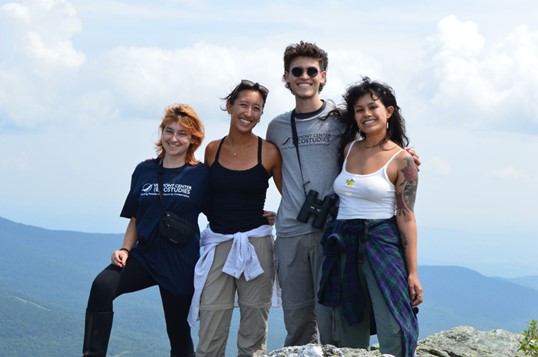
Trip to the top of Mount Mansfield with Emily Marple, Pablo Sosa-Negron, and Melory Brandao (left to right). Taken by a lovely random bystander. We had just completed our mountain arthropod surveys.
This summer has been like a whirlwind tour of nature’s carnival, complete with feathered fashion shows, loon operas, and butterfly ballets. This experience underscored the interconnectedness of all species within ecosystems and the importance of preserving biodiversity for the well-being of our planet. I am extremely grateful that I got to have this experience this summer.
